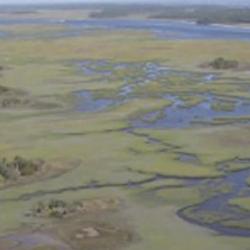Source Institutions
Source Institutions
Add to list Go to activity
Activity link broken? See if it's at the internet archive

In this activity, learners model estuaries, artificially enriching both fresh and salt water samples with different amounts of nutrients and observing the growth of algae over several weeks. Learners relate their results to the phenomenon of algae blooms in estuaries. Learners then analyze data for different sites at the Guana Tolomato Matanzas National Estuarine Research Reserve (GTMNERR) in Florida to discover the relationships between nitrogen, chlorophyll, and dissolved oxygen. Finally, learners study how nutrients cycle through an estuary and suggest recommendations for reducing nutrient inputs to estuary waters.
- 45 to 60 minutes
- 1 to 4 weeks
- $5 - $10 per group of students
- Ages 14 - 18
- Activity, Experiment/Lab Activity, Lesson/Lesson Plan
- English
Quick Guide
Materials List (per group of students)
- Computers or computer and projector
- Copies of Readings (pages 10-11 of PDF)
- Copies of Worksheet (pp.13-18 of PDF)
- Copies of Data Sheets (pp.19-22 of PDF)
- Water source (preferably from an estuary) with algae
- Liquid plant fertilizer
- Sea salt
- Measuring teaspoons
- 600 ml beakers
- Safety eyewear
- Digital camera
Subjects
-
Earth and Space Science
-
Earth Processes
- Geochemical Cycles
-
Earth Structure
- Oceans and Water
- Biosphere
-
Earth Processes
-
Life Sciences
- Cells
-
Diversity of Life
- Plants
-
Ecology
- Ecosystems
- Energy Flow and Chemical Cycles
- Human Impact
-
Physical Sciences
- Chemistry
-
Mathematics
-
Data Analysis and Probability
- Data Analysis
-
Data Analysis and Probability
-
The Nature of Science
-
Science and Society
- Risks and Benefits
-
The Scientific Process
- Conducting Investigations
- Gathering Data
- Formulating Explanations
- Communicating Results
-
Science and Society
Informal Categories
- Nature and Environment
Audience
To use this activity, learners need to:
- see
- read
- touch
Learning styles supported:
- Involves teamwork and communication skills
- Uses STEM to solve real-world problems
- Involves hands-on or lab activities
Other
Includes alignment to state and/or national standards:
Includes assesments for student learning:
This resource is part of:
Access Rights:
- Free access
By:
Rights:
- All rights reserved, NOAA/National Estuarine Research Reserve System (NERRS),
